Many people turn to St. John’s Wort because they want something "natural" to help with low mood. It’s sold right next to vitamins in drugstores, and ads make it sound harmless-maybe even safer than pills. But here’s the truth: mixing St. John’s Wort with SSRIs isn’t just risky. It can land you in the hospital-or worse.
What is St. John’s Wort, really?
St. John’s Wort (Hypericum perforatum) is a yellow-flowered plant that’s been used for centuries. Today, it’s marketed as a supplement for mild depression. In Europe, it was once prescribed like a real medicine. In the U.S., it’s sold over the counter as a dietary supplement, meaning the FDA doesn’t test it for safety or effectiveness before it hits shelves.
Most products contain 0.3% hypericin and are dosed at 300 mg three times a day. That’s 900 mg total. Sounds simple, right? But what’s inside the capsule isn’t just one compound. It’s a mix of chemicals, and the biggest troublemaker is hyperforin. This ingredient doesn’t just help with mood-it turns on enzymes in your liver that scramble how your body handles other drugs.
Why SSRIs are dangerous with St. John’s Wort
SSRIs-like sertraline, escitalopram, fluoxetine, and paroxetine-are the most common antidepressants prescribed today. They work by increasing serotonin in your brain. That’s how they lift mood. But when you add St. John’s Wort, you’re essentially double-dosing on serotonin.
St. John’s Wort doesn’t just have one effect. It acts as a weak serotonin reuptake inhibitor, just like SSRIs. On top of that, it also blocks monoamine oxidase, a brain enzyme that normally breaks down serotonin. So now, your body is making more serotonin and stopping it from being cleared out. Add that to an SSRI, and serotonin levels can spike dangerously fast.
The result? Serotonin syndrome.
What is serotonin syndrome-and why it’s not just "feeling off"
Serotonin syndrome isn’t a mild side effect. It’s a medical emergency. Symptoms start small: sweating, shivering, restlessness, nausea. But they can explode into high fever (over 41°C), muscle rigidity, seizures, kidney failure, or even death.
Doctors use the Hunter Criteria to diagnose it. You need at least three of these: mental confusion, agitation, tremor, muscle twitching, overactive reflexes, sweating, diarrhea, or high body temperature. Some people get symptoms within 24 hours. Others take up to two weeks. There’s no warning label on the bottle that says "this could kill you." And that’s the problem.
A 2025 review in the European Psychiatry journal looked at 17 confirmed cases where St. John’s Wort was mixed with SSRIs. Every single case involved serotonin syndrome. Nine involved sertraline. Eight involved paroxetine. But here’s the twist: it’s not just about which SSRI you take. It’s about how your body processes it. St. John’s Wort speeds up the breakdown of some SSRIs, but also boosts serotonin directly. So even if your SSRI dose stays the same, your brain gets flooded.
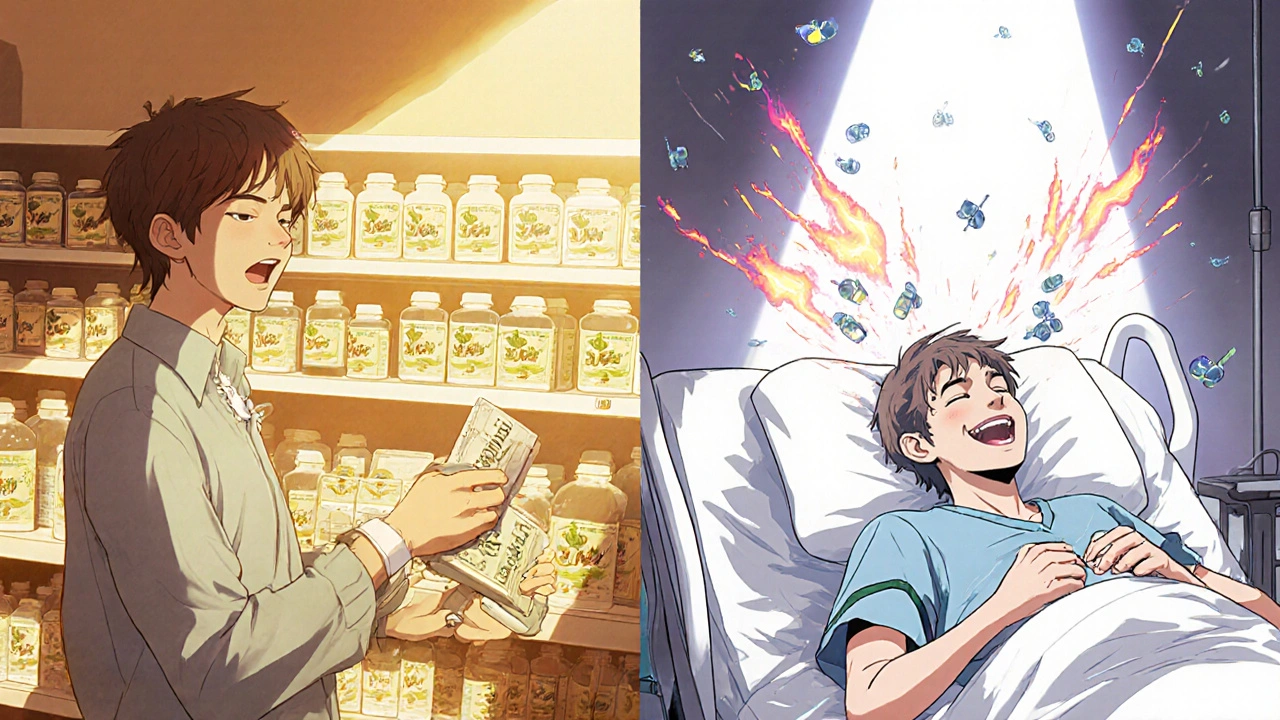
The hidden risk: most people don’t tell their doctor
Here’s a shocking stat: only about 33% of people who take herbal supplements like St. John’s Wort tell their doctor. Why? Because they think it’s "just a herb." They don’t see it as medicine. But it acts like one-and with far less oversight.
Doctors don’t always ask. Patients don’t always volunteer. And when someone comes in with confusion, fever, and shaking after starting a new supplement, the connection isn’t obvious unless someone thinks to ask: "Are you taking anything else?"
That’s why the American Psychiatric Association, the European Medicines Agency, the Mayo Clinic, and the Cleveland Clinic all say the same thing: do not combine St. John’s Wort with SSRIs. Not even for a few days. Not even if you feel like you need a little extra help.
It’s not just SSRIs-St. John’s Wort messes with a lot of meds
If you think this is only a problem with antidepressants, you’re wrong. St. John’s Wort interferes with dozens of medications because of how it activates the PXR receptor in your liver and gut. This turns on enzymes that break down drugs too fast.
- Birth control pills: It can cut hormone levels by 30-50%. There are real cases of women getting pregnant while on the pill and taking St. John’s Wort.
- Warfarin: It lowers INR levels, making blood thinner and increasing clot risk.
- Cyclosporine and tacrolimus: Used after organ transplants. St. John’s Wort can drop levels by 60%, leading to organ rejection.
- Seizure meds: Phenytoin, carbamazepine-levels drop by 20-40%. That means more seizures.
- HIV meds: Indinavir levels drop by 57%. That’s a direct path to drug resistance.
There’s no safe list. If you’re on any prescription medication, assume St. John’s Wort could interfere. Talk to your doctor before taking it-even if you think it’s "safe."
What should you do if you’re already taking both?
If you’re currently taking St. John’s Wort and an SSRI, don’t stop either suddenly. That can cause withdrawal or worsen depression.
Here’s what to do:
- Call your doctor or pharmacist. Tell them exactly what you’re taking-name, dose, how long.
- Don’t quit St. John’s Wort cold turkey. Taper off slowly under supervision.
- Wait at least two weeks after stopping St. John’s Wort before starting or restarting an SSRI. Some experts recommend three weeks for full clearance.
- Watch for symptoms of serotonin syndrome during the transition. If you feel worse, confused, sweaty, or shaky, go to the ER.
There’s no shortcut. This isn’t something you can wing. The risks are real, and the timeline matters.
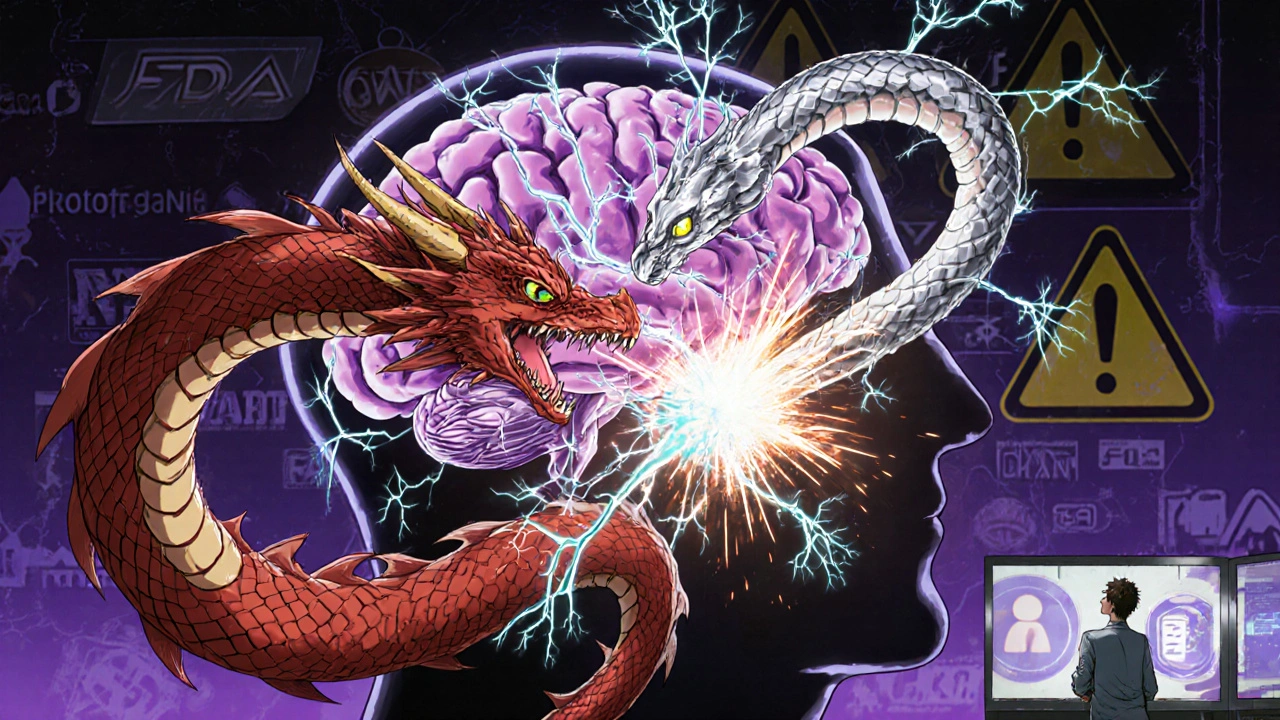
Are there safer alternatives?
If you’re looking for natural support for low mood, there are options that don’t carry this level of risk:
- Exercise: Just 30 minutes of brisk walking five days a week has been shown to be as effective as SSRIs for mild depression in multiple studies.
- Cognitive behavioral therapy (CBT): Proven to work as well as medication for mild to moderate depression-with no side effects.
- Vitamin D: Low levels are linked to depression. Testing and correcting deficiency is safe and often helpful.
- Omega-3s: High-dose EPA (1,000-2,000 mg/day) has shown antidepressant effects in clinical trials.
None of these cause dangerous drug interactions. None of them require you to guess about dosing or purity. And none of them come with a hidden risk of serotonin syndrome.
Why is this still a problem?
St. John’s Wort sales in the U.S. hit $156 million in 2022. It’s the third most popular herbal supplement for mental health. Yet, the FDA has issued 12 safety alerts about it since 2018. Canada made it prescription-only in 2023 after 17 serotonin syndrome cases. The FDA is now pushing for warning labels on all packages.
But here’s the gap: regulation lags behind use. People don’t know. Doctors don’t always ask. And the supplement industry doesn’t have to prove safety before selling.
That’s why education matters. If you’re taking anything for your mood-prescription or not-know the risks. Ask your doctor. Don’t assume "natural" means "safe."
Bottom line
St. John’s Wort isn’t a gentle herbal remedy. It’s a powerful biochemical agent with documented, life-threatening interactions. When mixed with SSRIs, it can trigger serotonin syndrome-fast, unpredictable, and deadly.
The science is clear. The warnings are loud. The risks far outweigh any benefit. If you’re using St. John’s Wort for depression, talk to your doctor about safer, evidence-based options. If you’re already on an SSRI, don’t add it. Ever.
Your brain doesn’t need another supplement. It needs the right care-and that starts with knowing what not to mix.
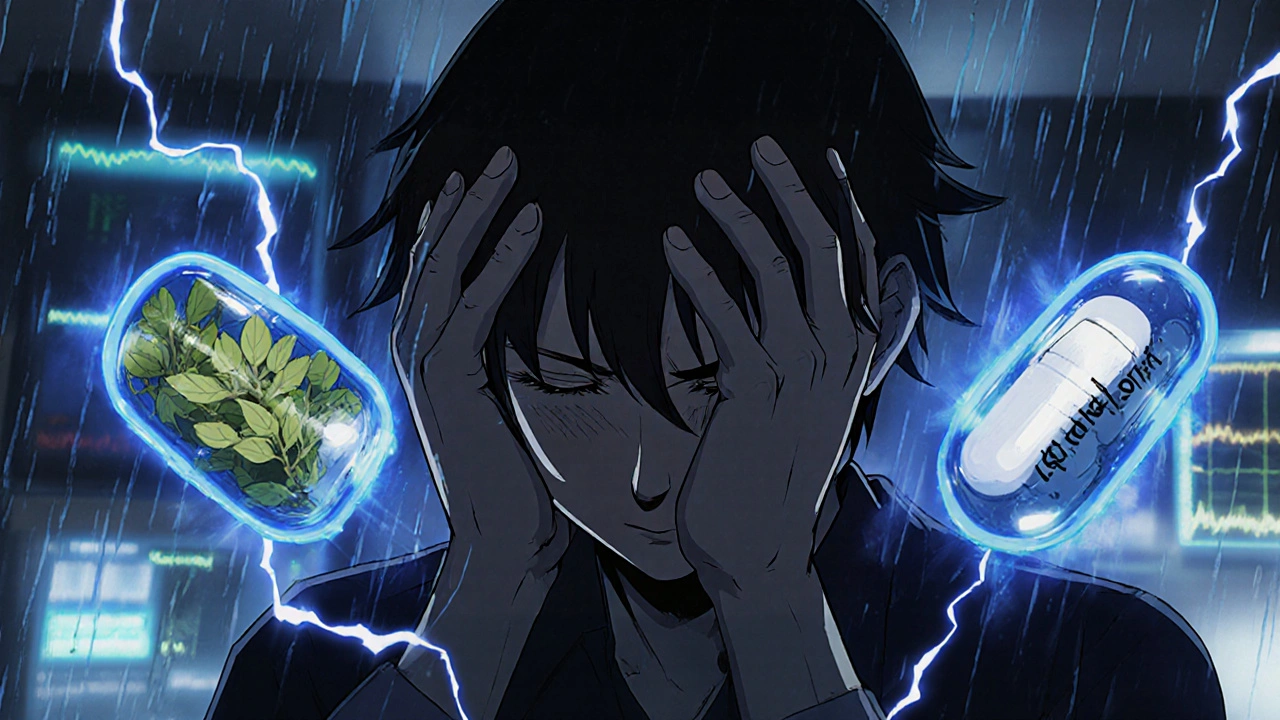

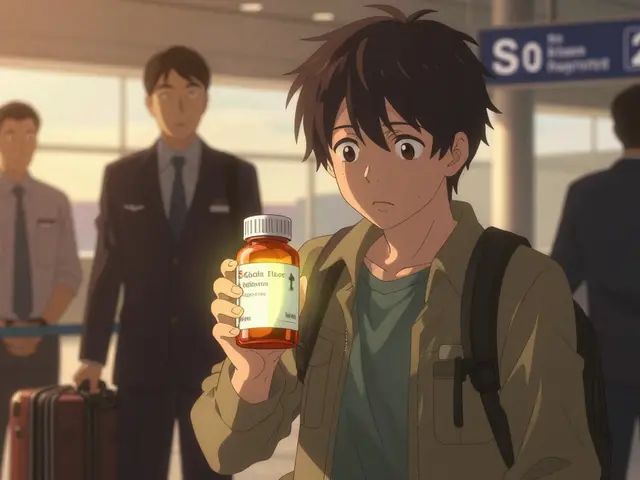
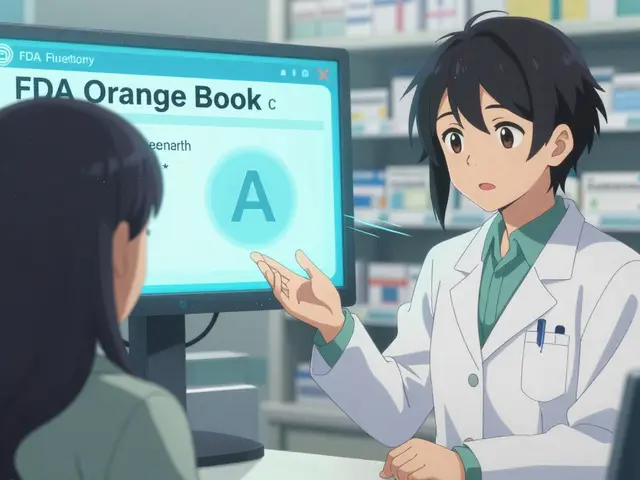
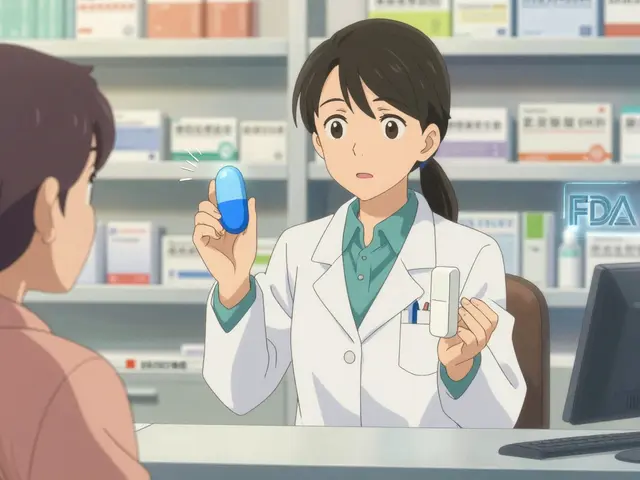

15 Comments
Jenny Lee
November 19, 2025This is the kind of post that saves lives.
Alex Boozan
November 20, 2025St. John’s Wort isn’t some herbal tea-it’s a cytochrome P450 modulator with pharmacokinetic consequences that rival pharmaceuticals. The FDA’s regulatory lacuna on supplements is a national disgrace. If you’re ingesting bioactive compounds without a prescription, you’re playing Russian roulette with your hepatic enzymes.
mithun mohanta
November 21, 2025OMG-this is so TRUE!!! I mean, like, hyperforin??? It’s not even a word people say out loud, but it’s the real villain here!! I took SJW with sertraline for 3 weeks and felt like my brain was vibrating inside my skull-then I blacked out for 12 minutes!! Doctors didn’t believe me until my INR crashed!!
Evan Brady
November 22, 2025Let’s be real: St. John’s Wort is the supplement industry’s version of a Trojan horse. It looks like a harmless little yellow flower, but inside? A biochemical orchestra playing a symphony of enzyme induction and serotonin overload. The fact that it’s sold next to gummy vitamins is criminal. And yes-it’s not just SSRIs. I’ve seen patients on warfarin, birth control, even transplant meds, who thought ‘natural’ meant ‘no consequences.’ Spoiler: it doesn’t. Your liver doesn’t care if it’s a plant or a pill-it just metabolizes. And when SJW flips the PXR switch, your meds become ghosts in your bloodstream.
Exercise and CBT? Way safer. And you get endorphins, not a trip to the ER.
Ram tech
November 23, 2025bro why even care? everyone takes herbs. my cousin took sjw with zoloft and he’s fine. maybe u just bad at medicine?
Erica Lundy
November 25, 2025The epistemological dissonance here is profound: we grant the authority of pharmacological science to synthetic molecules while simultaneously granting moral virtue to botanicals-despite the latter having less rigorous characterization, more variable potency, and no accountability structure. The notion that ‘natural’ implies ‘safe’ is a romantic fallacy, one that obscures the material reality of pharmacodynamics. The human body does not distinguish between origin; it responds to molecular structure. To conflate cultural perception with biochemical truth is not merely negligent-it is a failure of intellectual integrity.
Kevin Jones
November 25, 2025They sell this stuff like it’s chamomile. It’s not. It’s a monoamine modulator with a half-life longer than your last relationship. And the fact that people don’t tell doctors? That’s not ignorance-that’s denial dressed in organic cotton.
Premanka Goswami
November 25, 2025Big Pharma paid the FDA to let SJW slide so they could keep selling SSRIs. You think they want you to get better naturally? They need you dependent. The ‘serotonin syndrome’ thing? A scare tactic to scare you back into pills. They even banned it in Canada-because they control the narrative. Wake up.
Alexis Paredes Gallego
November 26, 2025Wait-so you’re telling me the government lets a plant that can KILL you be sold next to aspirin… but they regulate CBD like it’s heroin? This isn’t science. This is corporate control. They don’t want you to heal without a prescription. SJW is the people’s antidepressant. They’re scared of it. That’s why they’re lying about serotonin syndrome.
Saket Sharma
November 27, 2025Anyone who takes SJW with SSRIs is either a moron or a suicide risk. No middle ground. The fact that this is even a question shows how little people understand pharmacology. You wouldn’t mix bleach and ammonia-why mix neurochemicals?
Shravan Jain
November 28, 2025sjw is just a placebo with side effects. the real issue is that people dont know how to feel without pills. its not the herb, its the culture of avoidance. you wanna fix depression? fix your life. not your chemistry.
Brandon Lowi
November 29, 2025They call it ‘herbal’-but it’s a pharmacological grenade with a pin pulled. And the FDA? They’re asleep at the wheel. This isn’t about ‘natural’ vs ‘synthetic.’ It’s about power. Who controls your brain chemistry? The corporation? Or the plant? The answer is written in your liver enzymes-and they’re screaming.
Joshua Casella
November 30, 2025I’m a nurse. I’ve seen serotonin syndrome up close. It’s not dramatic-it’s terrifying. A patient I cared for had a fever of 41.3°C, rigid muscles, and couldn’t speak. He’d been taking SJW for ‘anxiety’ and sertraline for ‘depression.’ He didn’t think they interacted. He was 24. He’s fine now-but he’ll never take herbs again. Please. Just talk to your provider. One conversation could save your life.
Richard Couron
November 30, 2025you think this is about health? no. it’s about control. they want you to buy pills, not plants. the real danger isn’t sjw-it’s the system that lets them sell poison as ‘medicine’ while demonizing nature. they’re scared you’ll find peace without a prescription. that’s why they lie about serotonin. they need you addicted.
Leilani O'Neill
December 1, 2025Let me tell you about my friend in Dublin-she took SJW while on paroxetine because her ‘doctor didn’t listen.’ She ended up in intensive care for 11 days. The hospital bill? €42,000. The lesson? ‘Natural’ doesn’t mean ‘safe.’ It means ‘unregulated.’ And in a world where profit dictates safety, ignorance is expensive.